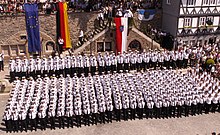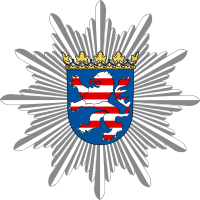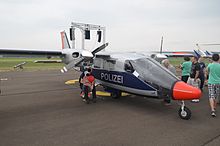Police Hesse
|
Police Hesse |
|
|---|---|
| State level | country |
| position | police |
| Supervisory authority | Hessian Ministry of the Interior and for Sport |
| Headquarters |
Wiesbaden , Hesse |
| Authority management | Roland Ullmann (State Police President) |
| Servants | 18,000 |
| Web presence | www.polizei.hessen.de |
The Hesse police force is the state police force for the German state of Hesse . It consists of almost 18,000 relatives. The number for 2007 is divided into around 15,500 civil servants and 2,500 employees.
The Hessian police were the first in Germany to exclusively introduce a two-tier career. There is only the higher and higher law enforcement service .
assignment

tasks
The mission is to ensure public safety and order . As a law enforcement authority , it takes action against unlawful and criminal acts, identifies offenders and analyzes patterns of crime. Another task is to avert danger in the area of internal security , that is to say, the prevention or suppression of illegal acts of any kind. In the context of traffic monitoring, it regulates traffic flows and plays a key role in emergency assistance ( emergency calls ). Furthermore, the police, in close cooperation with authorities for crime prevention to possible offenses in advance to detect and prevent.
Legal bases
For the area of hazard prevention, the police's powers to intervene are based on the Police Act of the State of Hesse, the Hessian Law on Public Safety and Order (HSOG).
The authorization to intervene in criminal prosecution results from the Code of Criminal Procedure (StPO).
organization
The State Police Headquarters , which is also a department of the Hessian Ministry of the Interior and for Sport , is the highest authority of the Hessian police. This is both the seven area competent police headquarters ( North Hesse , Osthessen , Frankfurt , Südhessen , Central Hesse , West Hessen and Southeast Hesse ), and the four Central competent authorities (Hessian riot Bureau , Bureau of Engineering, Hessian State Office of Criminal Investigation and the Police Academy Hesse reports directly).
Organizational reform
In 2001 the organization of the Hessian police was fundamentally reformed. Before the organizational reform, there was a three-stage structure:
- Supreme Police Authority: Department III of the Hessian Ministry of the Interior and for Sport.
- Medium police authorities: The regional councils Darmstadt, Giessen and Kassel.
- Lower police authorities: 14 police headquarters and 6 police headquarters.
As a result of the reorganization, the responsibilities were outsourced from the regional councils and divided between the seven new regional councils according to the areas of responsibility. Since then, all police headquarters in Hesse are directly subordinate to the state police headquarters (former Department III) of the Ministry of the Interior.
By streamlining the former 27 and now 11 authorities, an optimization has been achieved in many ways. Unnecessary duplication of work could be reduced, decision-making processes could be shortened and police officers were distributed more fairly according to the workload. Another effect was that many police officers were now able to go back to their original police work due to the reduced administrative volume.
Guard Police
The Hessian security guard was introduced in October 2000. Members of the guard police are employees of the state of Hesse. After a pilot phase in the police headquarters in Frankfurt, Central Hesse and North Hesse with 110 employees, there was an increase in 2002 by 250 police officers. Currently (as of 2010) there are 534 police officers on duty in the state of Hesse. In 2015, it was decided to increase the number of police officers by 100 for the whole of Hesse, and the application and aptitude selection process began in January 2016. The security guard is responsible, among other things, for property protection, foot patrol and identification services, which are also carried out by the security police.
Voluntary police service
Hessen has had a voluntary police service since 2000 . This service, which has also been set up in some other federal states, is carried out by voluntary citizens. The tasks of the voluntary police service in Hesse consist mainly of providing assistance and support. The members take on activities such as monitoring traffic, are present at public festivals and parades and otherwise serve to prevent criminal offenses and administrative offenses from being committed.
Clearance rate
The clearing-up rate in Hesse was 65.2% in 2019 and thus again represents a high level with a slight increase compared to the previous year.
Clarification rate and number of cases from Hessen since 1997:
| year | Case numbers | Change to the previous year | enlightened |
|---|---|---|---|
| 1997 | 457,408 | −3,971 (−0.9%) | 203,053 (44.4%) |
| 1998 | 446,877 | −10,531 (−2.3%) | 211,794 (47.4%) |
| 1999 | 427,805 | −19,072 (−4.3%) | 203,089 (47.5%) |
| 2000 | 419.766 | −8,039 (−1.9%) | 204,101 (48.6%) |
| 2001 | 409.326 | −10,440 (−2.5%) | 198,983 (48.6%) |
| 2002 | 431,460 | +22,134 (+ 5.4%) | 207,996 (48.2%) |
| 2003 | 454,550 | +23,090 (+ 5.4%) | 224,576 (49.4%) |
| 2004 | 462.208 | +7,658 (+1.7%) | 242,765 (52.5%) |
| 2005 | 441.830 | −20,378 (−4.4%) | 240,892 (54.5%) |
| 2006 | 427.238 | −14,592 (−3.3%) | 235,371 (55.1%) |
| 2007 | 420.725 | −6,513 (−1.5%) | 235,374 (55.9%) |
| 2008 | 407.357 | −13,368 (−3.2%) | 232,507 (57.1%) |
| 2009 | 407.022 | −335 (−0.1%) | 235,133 (57.8%) |
| 2010 | 401.864 | −5,158 (−1.3%) | 234,464 (58.3%) |
| 2011 | 396.834 | −6,513 (−1.3%) | 232,045 (58.5%) |
| 2012 | 395.625 | −1,209 (−0.3%) | 232,440 (58.8%) |
| 2013 | 386.778 | −8,800 (−2.2%) | 230,041 (59.5%) |
| 2014 | 396.931 | +10,153 (+ 2.6%) | 235,370 (59.3%) |
| 2015 | 403.188 | +6,257 (+1.6%) | 241,649 (59.9%) |
| 2016 | 412.104 | +8,916 (+ 2.2%) | 258,483 (62.7%) |
| 2017 | 375.632 | −36,472 (−8.9%) | 235,815 (62.8%) |
| 2018 | 372,798 | −2,834 (−0.8%) | 239,336 (64.2%) |
| 2019 | 364.833 | −7,965 (−2.1%) | 237,736 (65.2%) |
education
Due to the two-part career within the Hessian police, after acquiring a university entrance qualification , you can only apply for the higher-level police enforcement service.
Higher service
The training to become a police or criminal detective in Hessen is a dual course of study and takes three years. During this time you study at the Hessian University for Police and Administration . There are departments in Wiesbaden, Mühlheim, Gießen and Kassel. Since September 2010, all newcomers have been trained in the Bachelor system and complete their studies as a Bachelor of Arts (police enforcement service "Schutzpolizei") or as a Bachelor of Arts (police enforcement service "criminal police") .
A civil servant relationship exists from the beginning to the end of the course . For this period, the job title of a police commissioner candidate or a police commissioner candidate is given.
The remuneration during the first year of study is around € 1,200 ( net ). This increases continuously until the end of the course. Then you will be promoted to a police commissioner or a police commissioner or a crime commissioner in grade A9. The salary is then around € 2,400 (gross). Depending on the area of responsibility, this salary is increased by supplements in accordance with the Hessian Salary Act (HBesG) (e.g. shift allowance).
Direct entry into the criminal investigation department
Since September 2006, the Hessian police have had the opportunity to start directly with the criminal police . The employment requirements remain the same. In the test results from the recruitment test, however, particular emphasis is placed on the requirements of the criminal police. There is therefore a separate ranking list for the criminal police. The course itself takes place in separate study groups.
requirements
In order to apply for the senior police enforcement service in Hesse, the following requirements must be met:
- standing up for the free democratic basic order at any time
- not judicially punished
- orderly economic conditions
- Abitur , technical college entrance qualification , master craftsman's examination or a corresponding educational qualification
- According to a police doctor's judgment, suitable for police service
- Minimum height of 155 cm
- Maximum age 36 years on the day of recruitment (exceptions for temporary soldiers)
- Driving license class B on the day of hiring (manual transmission)
- German citizenship is not required, the same requirements apply to EU citizens as to Germans
- Applicants from non-EU countries must also meet the following requirements:
- valid settlement permit for Germany
- lived in Germany for five years
- Command of the native language in words
Recruitment test
The recruitment test consists of four parts that are spread over two days.
First you go through a computer-aided test procedure. In this first section you complete an intelligence test, a perception and concentration test, a questionnaire designed to filter out conspicuous personality traits, and a spelling test.
The athletic skills are then tested. The sports test in Hesse includes the following disciplines: figure eight, bench press, five-man jump and the 500-meter spiral run.
The first day ends with a group discussion and an individual interview. In the group discussion, the group is given a task that must be discussed and solved together. In the individual interview, questions about the applicant's personality and the job of a police officer are asked.
On the second day, the police doctor will determine whether you are fit for police service. These include a. Vision and hearing tests, a general medical examination, a drug test, a blood test and an exercise ECG.
Course of studies

The course is divided into theoretical and practical study sections. After the first theoretical semester, basic training in the riot police follows in the second semester, which is accompanied by an eight-week basic internship at a police station. There, basic work processes, techniques and methods are conveyed, which are an important basis in the later service.
This is then followed by the third semester, which ends with a four-week internship, which is used to convey traffic police measures more intensively. The 4th semester has a purely theoretical content. The following 5th semester consists of two practical sections, an investigation training and the large internship. In this internship you do your duty in a police station or a police station as well as a criminal investigation department. The course ends with the successful completion of the 6th semester, which again conveys theoretical basics. In subjects such as operational studies, administrative law, criminology, traffic law and criminal law / criminal procedure law, exams must be written and passed during each theoretical semester. In addition, the successful completion of a Bachelor thesis (thesis) in the 5th semester, which must later be defended before an examination board.
If all these exams have been passed, one receives the degree of Bachelor of Arts and is appointed as a police commissioner or a detective commissioner.
Higher service
For high-performing civil servants in the higher service, there is the possibility of moving up to the higher police force if they perform above average in their daily work . One of the prerequisites for this is to pass the final grade of the career examination with at least 10.5 points. After successfully completing the aptitude selection process for higher police enforcement service, the officers can be appointed as police council candidates.
The training takes place in the form of a two-year master’s course, the first year of which is completed at the Hessian University for Police and Administration and the second year at the German Police University in Münster. The German Police University (DHPol) has overall responsibility for the course .
The HfPV conducts the first year of study in cooperation with the responsible educational institutions in the federal states of Rhineland-Palatinate and Saarland . The modules of the course are offered in block form and each end with a written or oral module examination. This academic year includes, among other things, an internship lasting several weeks in authorities and commercial enterprises.
The contents of the second year of study range from operational studies and psychology to criminology and law to management training . Upon successful completion of the course, the academic degree "Master of Arts (MA) Public Administration - Police Management" is acquired, which entitles the holder to enter the higher service as a police officer (PR)
equipment
uniform
At the end of 2007 / beginning of 2008 the new blue police uniform was introduced in Hessen . The conversion was completed at the end of 2008, so that all officers are now dressed in the new uniform.
The police of the states of Thuringia and Saarland adopt the new blue uniform of the Hessian police. Furthermore, the Frankfurt city police and the Darmstadt municipal police (both institutions are auxiliary police in the sense of § 99 HSOG) are taking over the new blue police uniform of the Hessian police. See also Ordnungspolizei (Hessen) .
The Hessian police use the P30 as a service weapon .
vehicles
Company vehicles are predominantly vehicles from the Volkswagen , BMW , Mercedes-Benz and Opel brands . Occasionally, vehicles from other manufacturers such as Ford are also used. Police cars are VW T5 , VW Tiguan , BMW 5 Series , Mercedes-Benz Vito , Opel Zafira Sports Tourer and Opel Insignia . Strip motorcycles are BMW R 1200 RT and BMW R 900 RT . The Yamaha FJR 1300 A was retired in 2014.
In the course of the color change, the color of the vehicles changed from green-silver to blue-silver or blue-white. The first blue and silver patrol cars were procured in early 2005.
New vehicles are registered with license plates in the form “WI-HP XXXX”, where “HP” stands for “Hessian police”. The reason for this change was the abolition of the official registration number on March 1, 2007.
On March 30, 2012 a tactical reconnaissance aircraft Vulcanair P68 Observer ( code D-GHEA ) was presented to the Hessian police as the new and first aircraft. It is used with its high-performance camera for surveillance and control flights in Hesse and Rhineland-Palatinate. It is the first small aircraft in the service of a German police force. In April 2016, a mission took place in the Hanover area on the occasion of the visit of US President Barack Obama and his visit to Berlin in November 2016.
Patrol cars BMW 5 silver-blue in new colors
Mercedes-Benz Vito patrol car in the old green-silver and old blue-silver paint scheme
Prisoner vehicle Mercedes-Benz Sprinter in the new blue and white paint scheme
License plate scanners
The Hessian police have been using license plate scanners again since January 2011. The nationwide use of the devices was criticized and banned by the Federal Constitutional Court in 2008. The Hessian Law on Public Safety and Order (HSOG) was revised accordingly and the legal requirements for using the devices were created.
ID cards
In February 2011, newly designed ID cards for the Hessian police were introduced. The type of ID was criticized as "unprofessional" because of several shortcomings.
particularities
- The sleeve badge of the water police is slightly different from the badge of the other police.
- Like many police forces in Germany, the Hessian police maintain an internet watch .
Affairs, scandals, criticism
Hessian police affair
At the turn of the year 2010/2011 there were media reactions and controversies in the Hessian state parliament due to the dismissal of the then state police president Norbert Nedela and the controversial appointment of a new president of the Hessian riot police. Nedela's successor was Udo Münch .
Criticism of missions
Operations by the Hessian police, which led to injuries to those involved, were criticized on various occasions in the media.
Bullying and "black files"
The HR magazine hessenschau reported in autumn 2011 about black files with the Hessian police that had been created internally by individual "rebellious" officers. The public prosecutor's office then attempted house searches to track down HR informants who reported on the TV program about files with the police or who allegedly obtained them. The Offenbach District Court and the Darmstadt Regional Court rejected the investigators' request. The decision to reject the house searches was issued in June 2011, but the district court of Darmstadt rejected the complaints of the public prosecutor's office in July 2011. One of the police officers affected, whose home was to be searched, was a police superintendent who considered himself a victim of bullying . In the proceedings against his employer, he came across that the police had kept black files on him. He complained about it publicly. In April 2011, the police officer enforced before the Darmstadt Administrative Court that he could inspect the documents.
Threat letters "NSU 2.0" and right-wing extremist incidents
Since August 2, 2018, the lawyer Seda Başay-Yıldız first received a series of threats by fax or e-mail, signed with "NSU 2.0" and based on data from official registration registers and retrievals in police computers of the first Frankfurt police station. After the suspension of a group of suspected Hessian police officers, the threats continued. Since February 2020, the Hessian politician Janine Wissler ( Die Linke ) has also received such threatening emails. Her personal registration data had also been requested from a Hessian police computer, this time from Wiesbaden . In July 2020, in addition to Wissler, two politicians from the Left Party working in Berlin , Martina Renner , a member of the Bundestag, and Anne Helm , the leader of the parliamentary group in the Berlin House of Representatives , received death threats from "NSU 2.0".
In the Hesse State Criminal Police Office (LKA) headed by Sabine Thurau , a commission for internal investigations has existed since 2018, which temporarily arrested a suspect and discovered numerous non-crime-related right-wing extremist incidents in Hesse's police force. Hesse's Interior Minister Peter Beuth ruled out the existence of a right-wing extremist network in the Hessian police until July 2020 . On July 9, 2020, he and Prime Minister Volker Bouffier also received threatening e-mails relating to the LKA investigations against the NSU 2.0 perpetrators. Because Beuth had not been informed by the LKA about the data retrieval from another police computer after his presentation, he appointed the director of the criminal investigation department in the Frankfurt am Main Police Headquarters, Hanspeter Mener, as a special investigator, who conducts the investigation from outside the LKA and directly to the State Police President Udo Münch should report.
Political attitudes survey
After the threatening emails from police computers became known, the criminologist Rafael Behr judged : Police officers are more prone to authoritarian and right-wing extremist attitudes than other professions because of their workload. Not only individuals but also small milieus such as service groups and work teams were often prone to racism. In addition, there is a "Code of Silence" widespread in the police, not reporting colleagues in order not to be regarded as traitors. This pattern of solidarity often prevents moral courage. This is why right-wing police officers are rarely fired. He expects the Frankfurt police to present the cases that have become known as absolute exceptions, then keep silent about them, lawyers negotiate the punishment for the perpetrators and they would remain in the police force.
In January 2020, the state government carried out a representative survey on political attitudes among the approximately 17,000 Hessian police officers, administrative officials and collective bargaining employees, in which 4,277 people took part. Of these, 64.4 percent of the police officers surveyed classified themselves as belonging to the political center, just under 19 percent as “moderately right”, 13 percent as “moderately left”, two percent as “left”, 1.6 percent as “right”. 97 percent considered parliamentary democracy “more or less” or “completely” the best form of government. 27.6 percent agreed with the statement that there was a “danger that Germany will become an Islamic country”. 44 percent were charged with xenophobia or racism. 66.1 percent affirmed the statement that immigrants made the country more colorful or diverse. According to Interior Minister Peter Beuth, the study confirmed that the right-wing extremist suspected cases in the Hessian police are isolated cases.
On the other hand, the political scientist Ursula Birsl judged from the scientific contribution of the study: This had missed its goal because several questions about extreme positions were deleted or defused. It is therefore not sufficiently informative to infer mere right-wing extremist individual cases. The strong approval of the Islamization thesis speaks against it.
See also
Web links
Individual evidence
- ↑ State budget for the financial year 2007 of the Hessian Ministry of the Interior and for Sport, Chapter 03 81 ( page no longer available , search in web archives ) (PDF)
- ^ Hesse police - organization .
- ^ Police Hesse - The history of the Hessian police and more… .
- ↑ Hesse Police - Guard Police. IKT WEB, PTLV, accessed on November 2, 2018 .
- ^ Hesse police force - voluntary police service .
- ↑ Police Hessen - 2019: Police crime statistics 2019 .
- ↑ www.vfh.hessen.de - Website of the HfPV Hessen .
- ↑ beamtenbesoldung.org .
- ↑ beamtenbesoldung.org (PDF)
- ↑ HBesG, HE - Hessian Salary Act - federal and state laws. Retrieved November 2, 2018 .
- ↑ www.polizei.hessen.de - Job information Police Hessen
- ↑ www.polizei.hessen.de - Requirements for the police profession
- ↑ www.polizei.hessen.de - aptitude selection process
- ↑ The concentration test in the police recruitment test. September 15, 2017. Retrieved April 2, 2018 .
- ↑ Good salary and vacation in the police service - Hesse police .
- ↑ admin: Master's degree in Police Management (MPM) .
- ↑ www.dhpol.de ( Memento from November 3, 2017 in the Internet Archive )
- ↑ www.polizei.hessen.de Chronicle of the Hesse Police Squadron, Part I: History of the entire squadron (paragraph March 30, 2012). Accessed December 6, 2013
- ^ Aerokurier - pilot magazine .
- ↑ German Press Agency : Mainzer-Rhein-Zeitung, article from January 10, 2011 ( page no longer available , search in web archives ) ( accessed on June 12, 2011)
- ↑ Jürgen Umbach: Hessische / Niedersächsische Allgemeine Zeitung, HNA article from February 12, 2011 (accessed June 12, 2011)
- ↑ Matthias Bartsch: Der Spiegel, article from November 3, 2010 (accessed June 12, 2011)
- ↑ Ralf Euler: Frankfurter Allgemeine Zeitung, FAZ article from February 16, 2011 (accessed June 12, 2011)
- ↑ https://www.faz.net/aktuell/rhein-main/frankfurt/staatsanwaltschaft-ermittelt-polizisten-pruegeln-hausmeister-krankenhausreif-11057010.html
- ↑ Frankfurter Rundschau, article "Brachialgewalt" due to trivialities "from October 27, 2010 (accessed on June 12, 2011)
- ↑ (Ref .: 1120 Js 76674/11)
- ↑ Janine Wissler: Special investigator investigates the case of threatening emails against left-wing politicians. Zeit Online, July 10, 2020
- ↑ Pia Rolfs: Scientist Rafael Behr: Police officers more susceptible to right-wing ideas than others. Frankfurter Neue Presse, December 18, 2018
- ↑ Survey of 17,000 officials: More than every fourth police officer in Hesse fears the Islamization of Germany. Tagesspiegel, February 3, 2020.
- ^ Matthias Bartsch, Jean-Pierre Ziegler: Right-wing extremists in Hessen: Experts criticize the interpretation of the police study. Spiegel online, March 6, 2020












